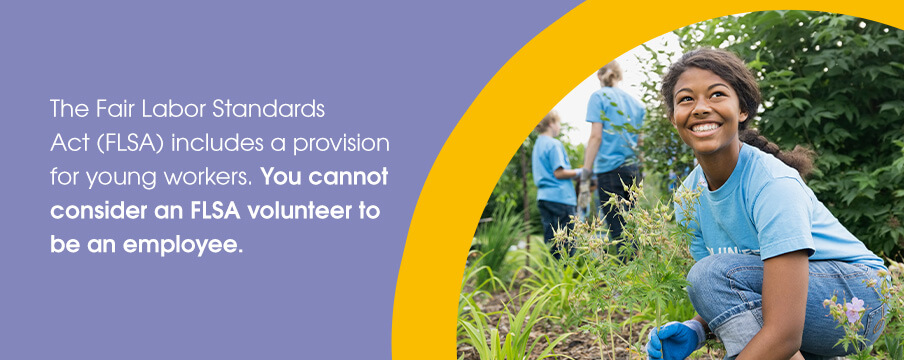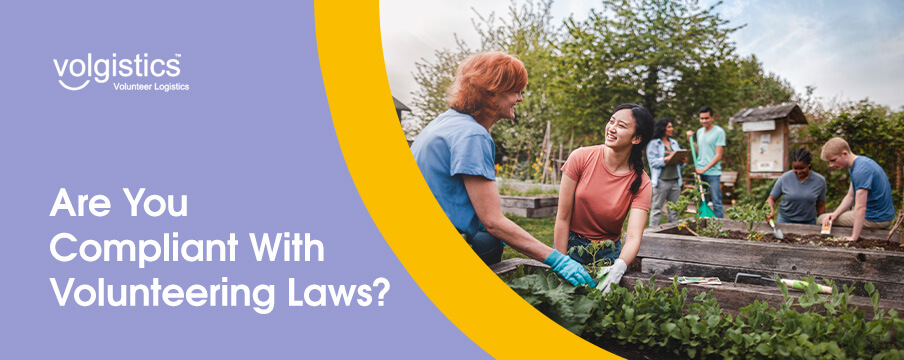Many organizations have little understanding of how volunteers intersect with the law. Volunteers are one of the most crucial aspects of achieving a mission for many organizations. However, it’s essential that you understand the laws around volunteering to ensure you maintain legal and effective practices. Understanding the laws and your obligations can provide protection for your organization and anyone helping you reach success. Keep reading to discover some common legal information regarding volunteer workers.
What Is a Volunteer vs. Employee?
One of the most important distinctions is understanding who is an employee and a volunteer. Although these two groups may have similar or overlapping tasks at times, it’s essential to follow all legal procedures in regard to payments, rewards, and other items.
A volunteer is an individual who completes service for a public agency for charitable, humanitarian, or civic reasons. These individuals perform service without promise, receipt, or expectation of compensation. People are only volunteers when they are providing services freely. If a person receives coercion or pressure from someone else, that person is not a volunteer. Individuals are not volunteers if they are employees of the agency and complete tasks they would otherwise complete anyway. Volunteers do not displace employees.
Employees receive compensation for their services, and employers tell employees what tasks to complete. Employees often have a specific number of hours or shifts they are expected to work, while volunteers can dedicate their free time when available. Employees can also receive other benefits, such as opportunities for insurance plans or bonuses.
Generally, organizations can rely on these questions to determine whether someone is an employee or a volunteer:
- Will the worker receive any benefit from your organization for performing services?
- Have you displaced regular employees to accommodate a volunteer?
- Are the services you’re asking for often associated with volunteer work?
- Is the individual offering their services freely?
- Is the task less than a full-time position or occupation?
- Is the organization receiving services a nonprofit?
You should answer the first two questions as “no” and the rest of the questions as “yes.” If your answers were different than this, you should put new regulations in place to better distinguish between employees and volunteers.
Additionally, employees who also volunteer for your organization cannot perform volunteer duties that are similar or related to their regular tasks. Nonprofits cannot require employees to work volunteer hours during their regular working hours and can only provide nominal rewards for employees who volunteer.
Laws on Volunteering Perks
Although most people understand that volunteers don’t receive compensation for their service, some organizations want to give some kind of gift for volunteer efforts. You must be careful with this practice because you could face several consequences if you break the law.
Typically, organizations must handle volunteer payments as they do employee payments. This process requires withholding income tax and other contributions. This means that while you cannot pay for community service hours, you can offer small gifts such as snacks or certificates.
Volunteering Laws to Be Aware Of
Your volunteers are some of your most important assets, which makes it vital to protect them. You must be aware of the rules and regulations for your organization and local, state, or federal laws. When you’re designing volunteer procedures, policies, and rules, it’s essential to evaluate these regulations to ensure you’re adhering to every rule. Below, you can find some common information regarding child labor laws, certificates and licensure, and the Fair Credit Reporting Act.
Certificates and Licenses
Some volunteers may need specific licenses or certificates to help your organization. For example, medical or counseling roles will often need to meet additional requirements to volunteer. Your organization’s requirements and local, state, and federal laws will dictate these requirements and the duties your volunteers can complete. Requirements must be the same for every person to avoid claims of discrimination.
Child Labor Laws

The Fair Labor Standards Act (FLSA) includes a provision for young workers. You cannot consider an FLSA volunteer to be an employee. Federal child labor laws do not apply to your young volunteers. However, you should be aware of the expectations for child workers.
For example, several states regulate hours for young workers under the age of 18, limiting how long they can work without a break, how many hours they can work each week, and whether they must be done working at a particular time of the night. You should review your state’s Department of Labor to understand the baseline for youth volunteers. You may also need parental consent for some youth volunteers.
Take a look at some standard information regarding federal child labor laws:
- People must be at least 14 years old to seek employment.
- Children between 14 and 15 years of age can work three hours on a school day and 18 hours during a school week.
- Youths between 14 and 15 can work up to eight hours on a non-school day or 40 hours on a non-school week.
- There are some job limitations for youths between 14 and 15.
- A 14- or 15-year-old worker can work between the hours of 7 a.m. and 7 p.m.
- Workers between 16 and 17 can work unlimited hours but cannot work hazardous jobs.
- Adult laws apply to workers 18 and older.
Volunteer Protection Act
Individuals looking for a nonprofit organization to volunteer at want to know they’re protected, and that’s where the Volunteer Protection Act comes in. The Volunteer Protection Act grants volunteers immunity from civil liabilities they cause due to negligence while volunteering. The act aims to increase volunteerism in communities by reducing potential risks volunteers could face.
Under the Volunteer Protection Act, volunteers cannot be liable for harm or injury caused by their act or omission if they were working according to their responsibilities and did not cause harm willfully. Additionally, the volunteer needs to have the proper licenses, certifications, or authorization to complete their tasks at the time the harm occurred. For example, the act would protect a volunteer from liability if they accidentally spilled water that caused another person to slip and fall or otherwise become injured.
Organizations must understand the Volunteer Protection Act to ensure they provide the necessary training to each volunteer and understand the potential risks that some duties could pose. Additionally, it is important to understand when exemptions to immunity apply. For example, if the volunteer commits a crime, attempts a sexual offense, violates state civil or federal law, or completes the act under the influence of drugs or alcohol, they are exempt from immunity.
Track Volunteer Activities With Volgistics

Tracking volunteer activities is one of the best ways to ensure you adhere to all the rules, regulations, and laws regarding your team. Thankfully, volunteer tracking software can simplify this process so you can remain organized, track what you need, and engage your volunteers.
Volgistics provides the resources you need to manage your program. This software allows you to easily track community service hours, communicate with volunteers, and access reporting to monitor program success. Volgistics offers a vast range of features, such as scheduling, creating volunteer profiles, accessing a volunteer portal, and more, so you can easily organize activities and communication.
Try a 30-day trial of Volgistics to understand how this solution can be your personal volunteer tracking solution.

